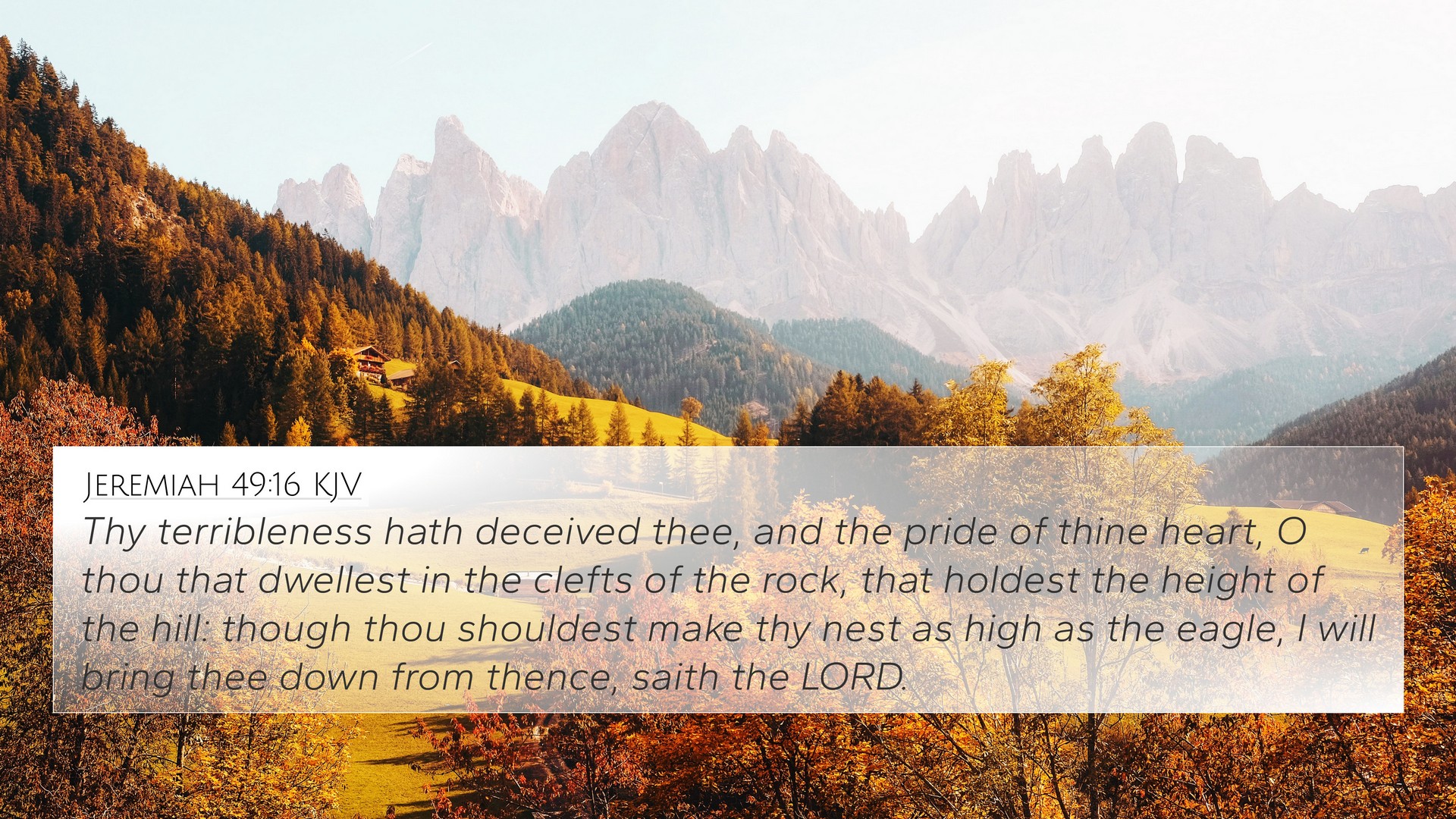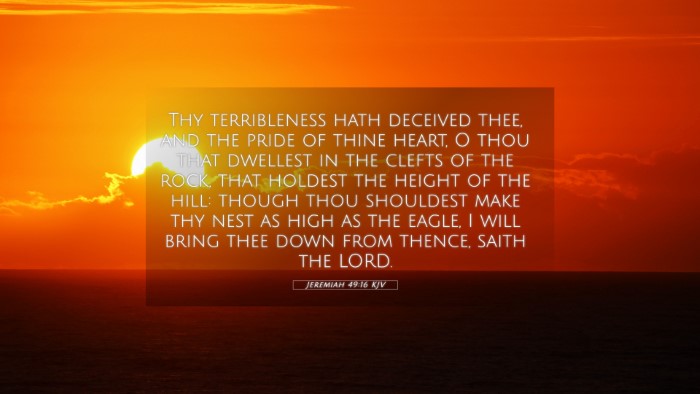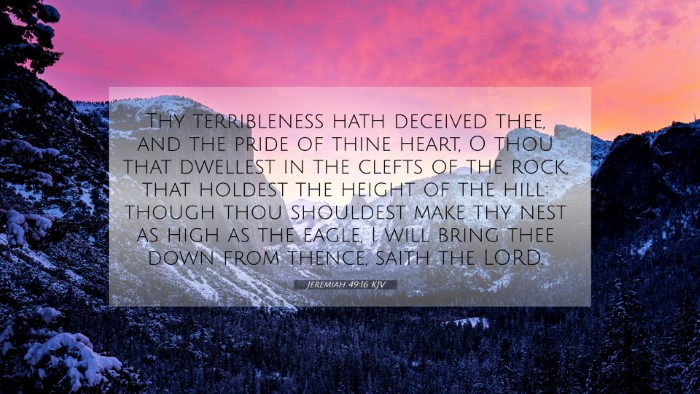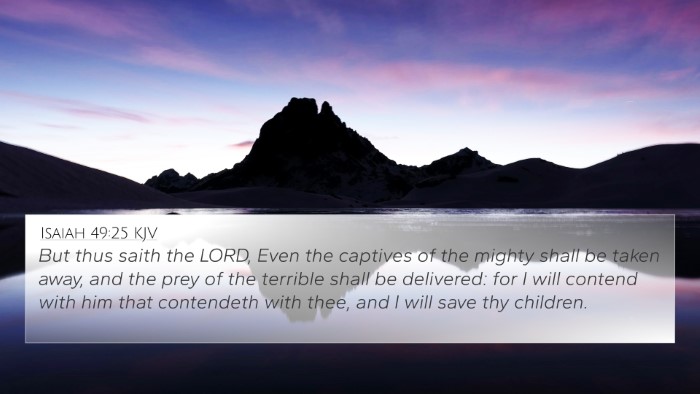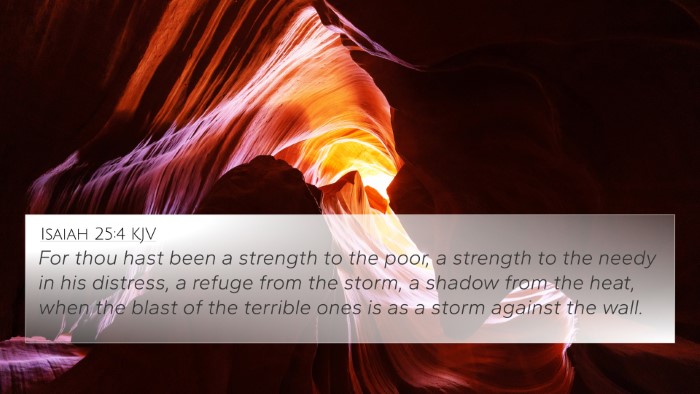Understanding Jeremiah 49:16
The verse Jeremiah 49:16 states:
"Thy terribleness hath deceived thee, and the pride of thine heart, O thou that dwellest in the clefts of the rock, that holdest the height of the hill: though thou shouldest make thy nest as high as the eagle, I will bring thee down from thence, saith the Lord."
Analysis of Jeremiah 49:16
This verse contains rich theological insights, illuminated by the combined perspectives of prominent public domain commentaries. Here, we explore the meanings drawn from the works of Matthew Henry, Adam Clarke, and Albert Barnes.
Interpretation Insights
- Deception and Pride: Henry emphasizes that the 'terribleness' of the people referred to in this verse signifies their power and might, which ultimately leads to their downfall due to pride. He draws a connection between pride and subsequent destruction as echoed throughout Scripture.
- The Symbolism of the Rock: Clarke comments on the phrase "clefts of the rock," interpreting it as a metaphor for security. The people believed their physical strongholds would protect them, paralleling other biblical warnings about misplaced trust (Psalm 62:6-7).
- The Height of the Hill: Barnes notes that their elevated status, akin to an eagle's nest, represents a false sense of security. This reflects the common biblical theme that God's sovereignty can overturn human arrogance (Proverbs 16:18).
Bible Verse Cross-References
To enhance understanding, here are several Bible verse cross-references that connect with Jeremiah 49:16:
- Obadiah 1:3: "The pride of thine heart hath deceived thee." This verse reinforces the theme of pride leading to fall.
- Proverbs 16:18: "Pride goeth before destruction." A direct link to the consequences of prideful attitude.
- Isaiah 2:12: The day of the Lord against all that is proud and lofty will be a significant reference point regarding divine judgment.
- Jeremiah 50:31: God's judgment against the haughty connect the themes of pride and impending downfall.
- Lamentations 3:34-36: Offers insights about God's judgment against arrogance and injustice.
- Psalm 49:16-20: Reminds readers that those who boast in their riches will ultimately perish.
- Proverbs 18:12: Highlights humility that comes before honor, contrasting pride as seen in Jeremiah 49:16.
- Micah 6:8: While not directly about pride, it speaks to the need for humility in our relationship with God.
Thematic Connections Between Bible Verses
Jeremiah 49:16 embodies broader themes found throughout the scriptures, including:
- Pride and Humility: The consistent biblical motif that those who are proud will be humbled (Luke 14:11).
- Human Security vs. Divine Sovereignty: The belief in security from physical strongholds contrasted with reliance on God (Psalms 20:7).
- Judgment and Deliverance: The dual message of warning and hope prevalent in prophetic literature (2 Peter 3:9).
Applying Biblical Cross-Referencing Techniques
For those engaging in a cross-referencing Bible study, here are some approaches:
- Use a Bible Concordance: Identify keywords from Jeremiah 49:16 and find related verses.
- Comparative Analysis: Explore the connections between similar themes in different scriptures.
- Chain References: Follow the themes of judgment and pride from verse to verse to deepen understanding.
- Thematic Study: Group verses that touch on similar ideas, such as pride's consequences and God's sovereignty.
Conclusion
In summary, Jeremiah 49:16 serves as a profound reminder of the dangers of pride and the illusion of security in human achievements. The combined insights from various commentaries reveal the timeless nature of biblical truth, as echoed across numerous scriptures. Through cross-referencing and thematic analysis, deeper understanding emerges, enriching the study of God’s word and its application in our lives.
By engaging in cross-referencing and thematic connections, believers can enhance their scriptural understanding and recognize the interconnectedness of the Bible, leading to a more profound spiritual growth.
